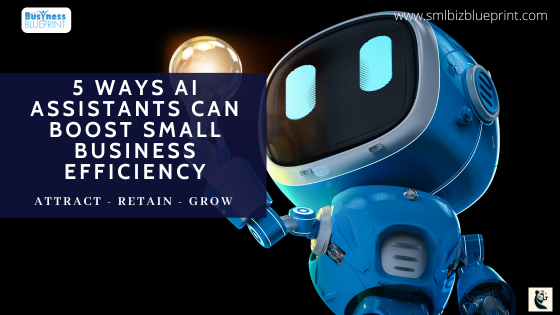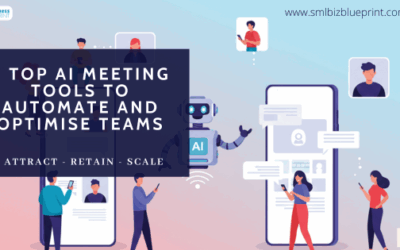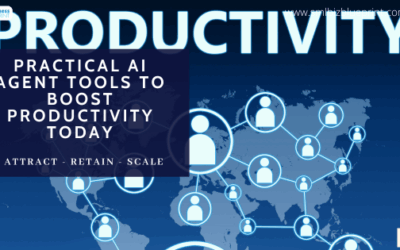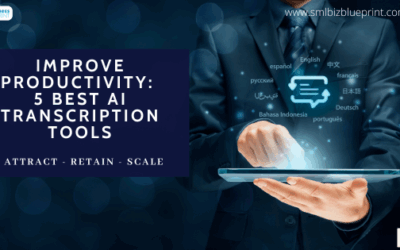Today, small business owners constantly seek ways to streamline operations and stay competitive.
One of the most powerful tools for doing so is AI assistants. Whether automating repetitive tasks, enhancing customer service, or driving more effective marketing campaigns, AI is a game-changer for small businesses.
In fact, according to a recent Salesforce study, 56% of growing small businesses are using AI to improve their daily operations.
This blog post will explore five powerful ways AI assistants can transform small business operations, helping you save time, improve workflow, and boost your bottom line.
We’ll cover how AI can revolutionise your business, from improving customer support to automating lead generation and optimising team productivity.
You’ll also discover practical examples and actionable steps for implementing AI solutions that can drive growth and efficiency in your company.
So, if you’re ready to learn how AI assistants can give your small business a competitive edge, keep reading to uncover these impactful strategies.

#1 AI for Small Business: How Artificial Intelligence Boosts Efficiency and Growth
In the world of small business, time is a precious commodity. Tasks like scheduling, data entry, managing customer inquiries, and tracking inventory can eat up valuable hours that could be better spent on growing your business.
This is where AI assistants step in to transform operations by automating repetitive tasks, improving accuracy, and enabling real-time decision-making.
Small businesses can boost efficiency and streamline workflows across daily operations by adopting AI.
One of AI’s most significant advantages for small businesses is its ability to handle routine administrative tasks seamlessly.
For example, virtual assistants like Google Assistant or Alexa can help you manage your calendar, set reminders for important meetings, or quickly find information with simple voice commands.
These AI tools free up time, allowing you to focus on strategic business decisions rather than operational details.
Beyond essential administrative support, AI-powered tools can quickly analyse vast amounts of business data, providing insights that enable better decision-making.
Small businesses can leverage this data to identify patterns, understand customer behaviour, and predict sales trends.
By integrating AI into your operations, you can be more responsive to market changes, enhance customer experiences, and make informed decisions that drive growth.
Additionally, AI assistants are always available, operating 24/7 without the constraints of human work hours. Whether managing order processing, handling after-hours customer inquiries, or supporting internal team functions, AI ensures your business remains active and efficient around the clock.
This constant availability helps you meet customer demands in real time and provides continuity in operations, even when your team isn’t physically present.
AI also brings accuracy and consistency to data entry, inventory management, and invoicing.
AI tools save time and minimise costly mistakes that affect your business’s bottom line by reducing human error. Imagine automating your inventory tracking so that you’re instantly notified when stocks are low or automating invoicing so that billing is processed on time and accurately.
Such automation reduces manual workload and improves overall efficiency.
Finally, the affordability of many AI solutions means that implementing AI for small businesses doesn’t have to be costly or complex.
Many AI assistants have easy-to-use interfaces and offer scalable pricing plans, making them accessible to businesses of all sizes and budgets.
According to a Deloitte study, small businesses adopting AI technology report a 25-30% improvement in overall efficiency and productivity, demonstrating the clear benefits of AI-powered automation for business growth.
#2 Revolutionize Customer Service with AI Assistants
In the era of instant communication, customers expect swift, personalised support from businesses, regardless of size.
One of the most effective ways to meet these expectations is to use AI assistants to enhance customer service operations.
With AI tools like chatbots, voice assistants, and virtual agents, small businesses can provide round-the-clock support, streamline interactions, and deliver tailored experiences that build customer loyalty.
Quick and Consistent Support
AI assistants like chatbots transform customer service by providing immediate and consistent responses to common inquiries. Unlike human representatives, AI chatbots can handle multiple conversations simultaneously, ensuring no customer is left waiting for assistance.
Whether answering frequently asked questions, providing product information, or guiding users through a return process, AI chatbots are designed to deliver quick, accurate solutions that improve the customer experience.
For example, businesses using tools like Drift or Tidio can set up AI chatbots on their websites to assist customers anytime. These AI assistants can respond to inquiries within seconds, instantly reducing wait times and providing helpful information.
This enhances customer satisfaction and frees your staff to handle more complex issues requiring a personal touch.
Personalised Customer Interactions
Another powerful benefit of AI assistants is their ability to deliver personalised customer interactions. By analysing browsing history, past purchases, and user behaviour, AI tools can tailor responses and recommend products or services based on individual preferences.
For example, an AI assistant can suggest complementary products during checkout or offer discounts to loyal customers, boosting sales and engagement.
Sephora’s AI-based chatbot, which uses customer data to make personalised beauty product recommendations, is a great case.
It helps customers find products that match their preferences, answers their beauty questions, and even assists with scheduling in-store appointments—all through a friendly, conversational interface.
This level of personalisation improves the customer experience and builds brand loyalty and trust.
Multi-Channel Support for Unified Customer Service
Customers interact with businesses across various channels—websites, social media, email, and more. AI assistants can consolidate these communications, providing multi-channel support and ensuring consistent customer experiences.
For instance, an AI chatbot like ManyChat can handle customer queries on your website and social media platforms, enabling seamless support across multiple touchpoints.
This unified approach to customer service helps small businesses maintain a consistent tone and style in their interactions, whether a customer is reaching out via Facebook Messenger, live chat on your site, or through an email query.
Enhanced Voice Support with AI Assistants
Voice AI is also popular for businesses aiming to enhance customer service. Tools like Siri, Google Assistant, and Alexa for Business allow customers to interact via voice commands, offering a more natural and interactive experience.
For instance, voice AI can quickly support product details, place orders, or even make reservations—without typing or navigating multiple web pages.
For small businesses, adopting voice AI can be a smart move to cater to customer preferences and provide a differentiated service experience that feels more personal and convenient.
According to Gartner, by 2025, 95% of all customer interactions will be powered by AI technology. This shows that businesses of all sizes increasingly rely on AI to provide efficient, scalable, and customer-friendly support.
#3 Automate Marketing with AI: From Lead Generation to Customer Engagement
Marketing is crucial for the growth of any small business, but it often demands significant time and effort to get it right.
Marketing can be overwhelming, from targeting the right audience to crafting engaging content and analysing performance.
This is where AI assistants can transform your marketing efforts by automating lead generation, content creation, and customer engagement.
With the power of AI, small businesses can launch more effective campaigns, drive sales, and build lasting relationships with customers—all while saving valuable time.
Generate High-Quality Leads with AI
One of the most impactful uses of AI in marketing is lead generation. AI assistants analyse vast amounts of customer data—such as behaviour patterns, social media activity, and browsing habits—to identify prospects who match your target audience profile.
Tools like HubSpot and Marketo Engage utilise AI to segment users, prioritise high-potential leads, and send tailored messages to capture attention at the right moment.
By understanding customer behaviour and preferences, AI allows you to focus on the prospects most likely to convert, making your marketing efforts more efficient and effective.
Personalised Content and Email Marketing
AI assistants also excel in creating and distributing personalised content. For example, AI-driven email marketing tools like Mailchimp use customer data to send targeted emails based on user behaviour, preferences, and past interactions.
Whether it’s welcoming a new subscriber, offering product recommendations, or sending a follow-up to cart abandoners, these AI tools craft personalised emails designed to boost engagement and increase sales.
Additionally, AI tools can optimise content for your audience by analysing what resonates best with your target market.
For instance, an AI assistant can identify which blog topics perform well, suggest headlines for social media posts, or analyse competitor content to ensure your messaging stands out.
Enhance Social Media Marketing and Scheduling
Social media can be a goldmine for small business marketing, but managing multiple platforms and maintaining a consistent posting schedule can be time-consuming.
AI-powered tools like Hootsuite and Buffer simplify this process by analysing the best times to post, recommending content, and even automating social media publishing across different platforms.
These AI tools use predictive analytics to help you understand when your audience is most active, ensuring your posts reach the maximum number of people.
They can also identify trending topics and hashtags to improve the visibility of your posts, allowing your business to stay relevant in a crowded social media landscape.
Optimise Ad Campaigns with AI Insights
Running paid advertising campaigns, like Google Ads or Facebook Ads, is often a key component of small business marketing. AI assistants help optimise these campaigns by analysing click-through rates, customer demographics, and past performance to deliver insights that drive more conversions.
Tools like AdRoll use machine learning to suggest adjustments to ad spend, identify high-performing audiences, and recommend creative changes to improve results.
By leveraging AI, small businesses can maximise the ROI of their ad campaigns, ensuring that every dollar spent is used effectively to attract the right customers.
According to McKinsey, businesses using AI in their marketing strategies see a 20% increase in sales and a 30% reduction in marketing costs, demonstrating the significant impact that AI-driven marketing can have on a small business’s bottom line.

#4 AI for Small Business Productivity: Save Time, Improve Workflow
For small businesses, productivity is the lifeblood that fuels growth and sustains daily operations.
However, juggling tasks like appointment scheduling, invoicing, inventory tracking, and team communication can often consume valuable time that could be better spent driving your business forward.
This is where AI assistants play a pivotal role. By automating routine tasks, improving workflows, and freeing up resources, AI helps small businesses save time and focus on higher-value activities.
Automate Routine Tasks to Boost Efficiency
Administrative work is a significant time drain for small businesses. Tasks such as scheduling appointments, managing invoices, and tracking inventory can become overwhelming, particularly as your business grows.
AI assistants like Calendly and x.ai can handle scheduling appointments with customers and partners, considering all parties’ availability and reducing the back-and-forth emails that usually accompany meeting planning.
Similarly, AI-based invoicing tools like FreshBooks or QuickBooks Online automate the process of generating, sending, and tracking invoices.
This automation ensures accurate billing and timely payments, reducing human error and improving cash flow.
Enhance Team Collaboration with AI Tools
Effective team collaboration is essential for small businesses to maintain productivity and ensure timely project completion. AI assistants can facilitate smoother communication, task management, and collaboration.
Tools like Slack’s AI-powered features help streamline internal messaging. They allow team members to quickly share updates, files, and progress reports while keeping the conversation organized through channels and threads.
Project management platforms like Trello, enhanced with AI-powered features like Butler, automate repetitive tasks such as setting due dates, assigning tasks, and sending reminders.
These tools ensure that everyone stays on track, that important tasks don’t slip through the cracks, and that project timelines are met efficiently.
Optimise Workflow with AI Document and Data Management
Managing documents and files can become a hassle as your small business scales. AI tools can help you quickly organise, store, and retrieve documents, eliminating time wasted on manual searches.
For instance, Zoho Docs and Google Drive with AI integration enable intelligent document sorting, categorisation, and sharing.
AI can also assist in analysing data for better decision-making. Tools like Microsoft Power BI provide AI-enhanced data analysis, offering insights into business performance, customer behaviour, and sales trends.
This analysis helps you make informed decisions without spending hours sifting through data manually.
Predictive Analytics to Streamline Inventory and Supply Chain
Inventory management can be a headache for small businesses, especially those dealing with physical products. AI assistants specialising in predictive analytics, like TradeGecko (now QuickBooks Commerce), can forecast inventory needs based on historical sales data and seasonal trends.
This helps ensure you’re never overstocked or understocked, reducing costs and ensuring customers always have access to the products they want.
AI also aids in managing the supply chain efficiently.
For instance, AI can automatically place orders when stock levels are low, track shipments, and monitor vendor performance to ensure timely deliveries.
According to an Accenture report, businesses that leverage AI for workflow automation see a 40% reduction in time spent on routine tasks, enabling teams to focus on more strategic, revenue-generating activities.
#5 Choosing the Best AI Tools for Your Small Business: A Practical Guide
Selecting the right AI tools for your small business can be a game-changer.
From marketing automation to customer support and productivity management, the right AI solution can drive efficiency, enhance customer experience, and boost revenue.
However, with so many options available, choosing the right AI assistant to fit your business needs and budget can feel overwhelming.
Here’s a practical guide to help you pick the best AI tools to power your small business.
Identify Your Business Needs and Pain Points
Before diving into the plethora of AI tools on the market, start by pinpointing your business’s specific needs.
Are you struggling with lead generation and marketing?
Or do you need to streamline customer service operations?
Maybe your main concern is automating internal workflows to improve team collaboration.
Understanding these pain points will help you focus on tools to deliver the most value for your business.
For instance, if you want to improve customer support, an AI chatbot like Zendesk’s AI Answer Bot can help by answering FAQs and efficiently handling customer inquiries.
On the other hand, if you want to enhance team collaboration, tools like Slack with AI integrations can streamline your team’s internal communication and project updates.
Compare Top AI Tools Based on Your Needs
Once you have a clear idea of your business goals, compare the AI tools for those specific functions.
Here are some of the most popular AI tools for different small business needs:
For Marketing Automation, HubSpot is one of the leading AI marketing platforms for small businesses. It provides tools for email marketing, social media scheduling, CRM management, and analytics. It uses AI to tailor customer experiences, automate workflows, and enhance lead nurturing.
For Customer Service: Tidio AI Chatbot offers customisable AI-driven chatbots that help small businesses automate customer interactions, provide instant responses, and capture leads. Its easy integration into websites and social media makes it a versatile tool for enhancing customer support.
For Team Productivity and Task Automation, Trello allows small businesses to automate project management with its Butler AI feature. Butler uses rule-based automation to assign tasks, send notifications, and streamline workflows, ensuring all team members stay on track without manually managing every detail.
For Data Analytics and Decision-Making, Google Analytics Intelligence is a free AI tool for analysing website performance, traffic sources, and user behaviour. It provides insights and recommendations that small businesses can use to improve their digital marketing strategies and enhance user experience on their websites.
Assess User Friendliness and Integration Capabilities
AI tools vary in complexity. It’s essential to choose a solution that’s not only powerful but also user-friendly, especially if your team doesn’t have technical expertise.
Look for tools with an intuitive interface, easy setup process, and robust customer support.
Additionally, consider how well the AI tool integrates with your existing software.
Tools like Zapier can help connect different software applications, but choosing AI assistants that natively integrate with platforms you already use (like your CRM, email marketing service, or inventory management system) will ensure a seamless workflow.
Budget Considerations and Scalability
One of the key concerns for small businesses is the cost of implementing AI tools.
Fortunately, many AI platforms offer scalable pricing models. They start with free or basic plans that include essential features and allow you to upgrade as your business grows.
For example, Mailchimp offers free and affordable plans that allow small businesses to start with basic AI-driven email marketing automation.
As your subscriber list grows, you can scale up to access more advanced features like predictive insights and personalised content recommendations.
When evaluating costs, think long-term. It’s better to choose a scalable tool that can grow with your business needs than a limited option that will require frequent replacements as your company expands.
According to a survey by Capterra, 44% of small businesses using AI solutions reported that these tools significantly improved business operations and customer satisfaction, underlining the transformative potential of AI when the right tools are chosen.
Conclusion
As technology advances, integrating AI assistants into small business operations is no longer a luxury—it’s a strategic move to stay competitive and grow efficiently.
From automating administrative tasks and revolutionising customer service to enhancing marketing campaigns and boosting productivity, AI is transforming how small businesses operate.
By choosing the right tools tailored to your business needs, you can unlock AI’s full potential and see real improvements in efficiency, customer satisfaction, and revenue.
Implementing AI may seem daunting, but starting small with just one or two AI tools that address your biggest pain points can make a significant difference.
Over time, as you see the benefits, you can gradually expand AI usage across different areas of your business. The time saved, costs reduced, and workflows optimised will allow you to focus on what matters most—growing your business and serving your customers effectively.
Ready to Transform Your Small Business with AI?
The benefits of AI are within reach, and now is the perfect time to start exploring how AI assistants can revolutionise your business.
If you’re looking for guidance on choosing the right AI tools or want to learn how to implement AI for maximum impact, reach out today.
Let’s make your business more efficient, customer-focused, and ready for the future.
FAQs
Q1: How can AI assistants improve efficiency in my small business?
A1: AI assistants automate time-consuming tasks such as scheduling appointments, managing customer inquiries, tracking inventory, etc. This allows you to focus on core business activities, saving time and reducing the risk of errors.
Q2: What are some practical examples of AI tools that can enhance my marketing efforts?
A2: AI tools like HubSpot and Mailchimp help personalise email campaigns, automate social media scheduling, and optimise ad spending based on performance. Additionally, AI analytics tools can provide insights into customer behaviour to tailor your marketing strategies better.
Q3: Is it expensive to implement AI assistants in a small business?
A3: Not necessarily. Many scalable AI solutions offer basic plans at affordable prices or even free versions with essential features. As your business grows, you can upgrade to plans with more advanced capabilities, making AI adoption cost-effective for small businesses.
Q4: Can AI assistants help with customer service for a small business?
A4: Yes, AI assistants like chatbots can respond to customer inquiries instantly, provide personalised support, and handle repetitive questions 24/7. This helps improve customer satisfaction while allowing your team to focus on more complex issues.
Q5: How do I choose the right AI tool for my small business needs?
A5: Start by identifying your business’s specific needs and pain points. Look for tools that align with those needs, have user-friendly interfaces, integrate well with your existing systems, and offer scalable pricing plans. Compare the features and benefits of top AI solutions before making a decision.
Q6: Do I need technical expertise to use AI assistants in my small business?
A6: Most AI tools are designed to be user-friendly and intuitive, so you don’t need extensive technical knowledge. Many platforms offer tutorials, customer support, and easy setup processes, allowing you to start using AI in your business with a minimal learning curve.
Q7: What results can I expect after implementing AI assistants in my small business?
A7: Businesses typically see many benefits, including improved efficiency, better customer service, enhanced marketing performance, and more effective workflow management. For example, according to Accenture, companies using AI have seen up to a 40% reduction in time spent on routine tasks, allowing them to focus on strategic growth.
Other Articles
What Every Small Business Owner Must Know Before Selling Their Business
10 Proven Ways to Skyrocket Your Brand Awareness on a Tight Budget
How to Master Competitive Pricing Without Losing Your Profit Margins




